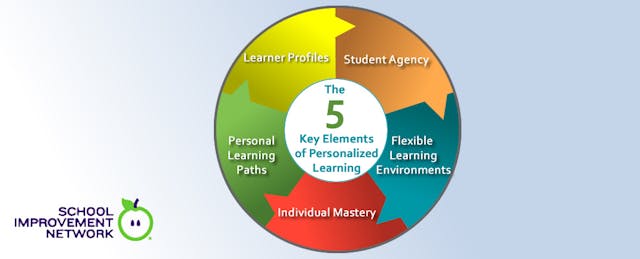The International Association for K-12 Online Learning (iNACOL) defines personalized learning as “tailoring learning for each student’s strengths, needs, and interests—including enabling student voice and choice in what, how, when, and where they learn—to provide flexibility and supports to ensure mastery of the highest standards possible.”
In a resource available from iNACOL, the organization notes that Scott Benson, former Program Officer for the Bill & Melinda Gates Foundation, identified the following list of key attributes for a personalized learning model (2013):
- Learner Profiles: This involves capturing the individual skills, gaps, strengths, weaknesses, interests, and aspirations of each student. It’s about knowing each student through a combination of assessments, surveys, and relationships built inside and outside of the classroom.
- Personal Learning Paths: This involves creating an individual pathway for each student, based on his or her unique learner profile. Each student has his or her own learning goals and objectives, and learning experiences are diverse and matched to the individual needs of students.
- Individual Mastery: Schools must continually assess student progress against clearly defined standards and goals. Students advance—generally at their own pace—based on demonstrated mastery of these learning targets.
- Flexible Learning Environments: Educators should include multiple options and approaches in their delivery of instruction to support student learning.
Here is one more essential element of personalized learning, based on iNACOL’s discussions with educators in the field:
- Student Agency: Students should have some control over how they learn. With the help of their teachers, they should be involved in designing their own learning process and should be given a choice in how to demonstrate their learning through performance-based assessments.
Throughout this month, we will be focusing on personalized learning by offering advice in a series of articles to help you tailor your instruction and assessment to the individual strengths, needs, and interests of each student.



